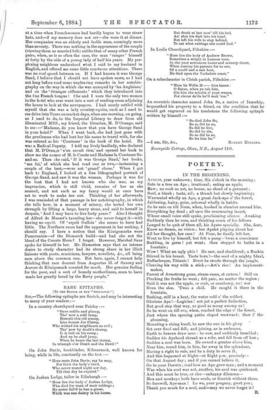SOME PERSONAL RECOLLECTIONS OF GEORGE SAND.
[To THE EDITOR OF TEE "SPECTATOR"] SIR,—The recent unveiling of George Sand's statue at La Chatre has set people thinking about her afresh. At no time since " Indiana " and " Lelia " first revealed the existence of a new writer of transcendent power, has her place in French literature, and her influence on the social problems of the time, and the question whether her artistic creations will or will not live, been canvassed with more energy than during the past few weeks. I think, therefore, that some personal recollections of her, con- tained in a letter I received the other day from my friend, Mrs.. Ellis, the authoress of " Sylvestra," may interest your readers, and I have obtained Mrs. Ellie's permission to send them to you.
—I am, Sir, &c., FANNY HERTZ. 12 Sheffield Gardens, Campden Hill.
"Above twenty years ago, I spent three days in a French hotel (at Tours) with George Sand, without knowing who she was. She puzzled me all the time, and had in person something of the same effect on me that her character—attractive and repul- sive—has still. She sat opposite me at a narrow table d'hôte,— a tall, large, strongly-built woman, with features in proportion • to her size. Her eyes were fine, but her force of appearance was rather physical than intellectual. It must have been the brain beneath the strong features which teased me as it did, to make out to myself who she could be. She was mature, but in no decline of force, massive, grave, and restful, with nothing Gallic about her. The dark hair, eyes, and tint might have belonged to Italy or Spain, quite as well as to France, and the bearing, better. Her dress might have been called 'dowdy.' It was of the type of the travelling Englishwoman, as French eyes see it, rather than French. I think her 'robe' was brown, which did not become her at all. Crimson would have suited her. She wore an ugly, large-brimmed, straw hat, with broad lace falling over the brim,
at a time when Frenchwomen had hardly begun to wear straw hats, and—if my memory does not err—she wore it at dinner. Her companion was an elderly and feeble man, seemingly more than seventy. There was nothing in the appearance of the couple (viewing them as married folk) unlike that of many other French pairs, when, as is so often the case, the man 'ranges' himself at forty by the side of a young lady of half his years. My per- plexing neighbour understood what I said to my husband in English, and offered me some little courteous attentions. There was no real speech between us. If I had known it was George Sand, I believe that I should not have spoken more, as I had not long before read some unplea3ing remarks in her autobio- graphy on the way in which she was annoyed by 'lea Anglaises,' and on the etranges siffiements ' which they introduced into the fine French tongue ! he and I were the only two women in the hotel who ever went into a sort of reading-room adjoining the house to look at the newspapers. I had nearly settled with myself that she was a lady country-squire, such as I used to see drive into Tours on market-days, when one morning, on going, as I used to do, to the Imperial Library to draw from old illuminated MSS., my friend, the librarian, M. D'Orange, said to me Madame, do you know that you have George Sand in your hotel ?' When I went back, she had just gone with the gentleman who had lent her his name to travel with, for she was entered as his Comtesse ' in the book of the hotel. He was a Radical Deputy. I told my lively landlady, who declared that M. D'Orange n'en savait Tien,' and opened her book to show me the names of M. le Comte and Madame la Comtesse So- and-so. Then she said, If it was George Sand,' her books, 'ma foi,' of which she had read one or two,—instancing a couple of the best,—were not 'grand' chose.' When I got back to England, I looked at a fine lithographed portrait of George Sand, and saw it was the woman. Perhaps it was for the best that I had not known who she was, as my impression, which is still vivid, remains of her as she seemed, and not such as my fancy would at once have set to work to make her out. Thinking of her afterwards, I was reminded of that passage in her autobiography, in which she tells how, in a moment of misery, she tested her own strength by lifting a large, heavy stone, and said to herself in despair, And I may have to live forty years !' Also I thought of Alfred de Musset's taunting her—she never forgot it—with having no esprit. Of esprit Gallois ' she seems to have had little. The Northern races had the uppermost in her making, I should say. I have a notion that the Kiinigsmarks were Pomeranian—of the Bismarck build—and had she not the blood of the Counts Horn P I forget. However, Marshal Saxe spoke for himself in her. Mr. Hamerton says that an intense desire to study character had its strong share in her illicit liaisons with poets, musicians, lawyers, novelists, &c., all being men above the common run. But here, again, I cannot help thinking that race descent from Augustus II. of Saxony and Aurore de Konigsmark counted for much. Her genuine feeling for the poor, and a sort of homely motherliness, seem to have made her greatly loved by the Berry people."



































 Previous page
Previous page